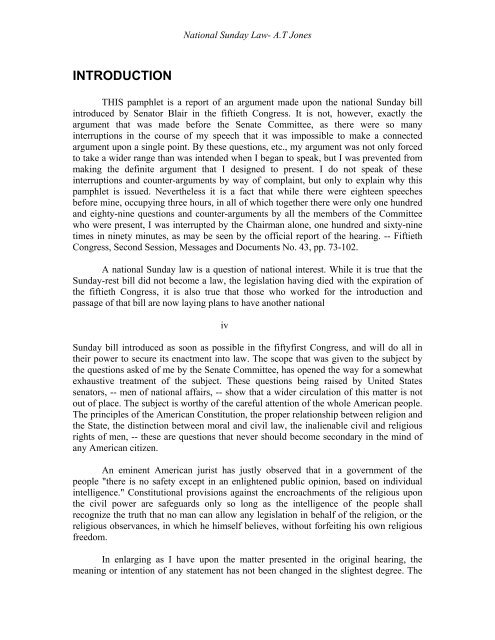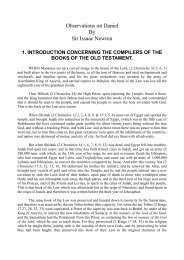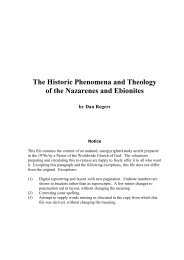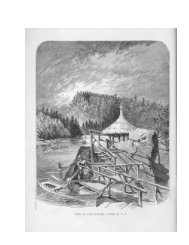THE NATIONAL SUNDAY LAW, ARGUMENT OF ALONZO T ...
THE NATIONAL SUNDAY LAW, ARGUMENT OF ALONZO T ...
THE NATIONAL SUNDAY LAW, ARGUMENT OF ALONZO T ...
Create successful ePaper yourself
Turn your PDF publications into a flip-book with our unique Google optimized e-Paper software.
INTRODUCTION<br />
National Sunday Law- A.T Jones<br />
THIS pamphlet is a report of an argument made upon the national Sunday bill<br />
introduced by Senator Blair in the fiftieth Congress. It is not, however, exactly the<br />
argument that was made before the Senate Committee, as there were so many<br />
interruptions in the course of my speech that it was impossible to make a connected<br />
argument upon a single point. By these questions, etc., my argument was not only forced<br />
to take a wider range than was intended when I began to speak, but I was prevented from<br />
making the definite argument that I designed to present. I do not speak of these<br />
interruptions and counter-arguments by way of complaint, but only to explain why this<br />
pamphlet is issued. Nevertheless it is a fact that while there were eighteen speeches<br />
before mine, occupying three hours, in all of which together there were only one hundred<br />
and eighty-nine questions and counter-arguments by all the members of the Committee<br />
who were present, I was interrupted by the Chairman alone, one hundred and sixty-nine<br />
times in ninety minutes, as may be seen by the official report of the hearing. -- Fiftieth<br />
Congress, Second Session, Messages and Documents No. 43, pp. 73-102.<br />
A national Sunday law is a question of national interest. While it is true that the<br />
Sunday-rest bill did not become a law, the legislation having died with the expiration of<br />
the fiftieth Congress, it is also true that those who worked for the introduction and<br />
passage of that bill are now laying plans to have another national<br />
iv<br />
Sunday bill introduced as soon as possible in the fiftyfirst Congress, and will do all in<br />
their power to secure its enactment into law. The scope that was given to the subject by<br />
the questions asked of me by the Senate Committee, has opened the way for a somewhat<br />
exhaustive treatment of the subject. These questions being raised by United States<br />
senators, -- men of national affairs, -- show that a wider circulation of this matter is not<br />
out of place. The subject is worthy of the careful attention of the whole American people.<br />
The principles of the American Constitution, the proper relationship between religion and<br />
the State, the distinction between moral and civil law, the inalienable civil and religious<br />
rights of men, -- these are questions that never should become secondary in the mind of<br />
any American citizen.<br />
An eminent American jurist has justly observed that in a government of the<br />
people "there is no safety except in an enlightened public opinion, based on individual<br />
intelligence." Constitutional provisions against the encroachments of the religious upon<br />
the civil power are safeguards only so long as the intelligence of the people shall<br />
recognize the truth that no man can allow any legislation in behalf of the religion, or the<br />
religious observances, in which he himself believes, without forfeiting his own religious<br />
freedom.<br />
In enlarging as I have upon the matter presented in the original hearing, the<br />
meaning or intention of any statement has not been changed in the slightest degree. The
















